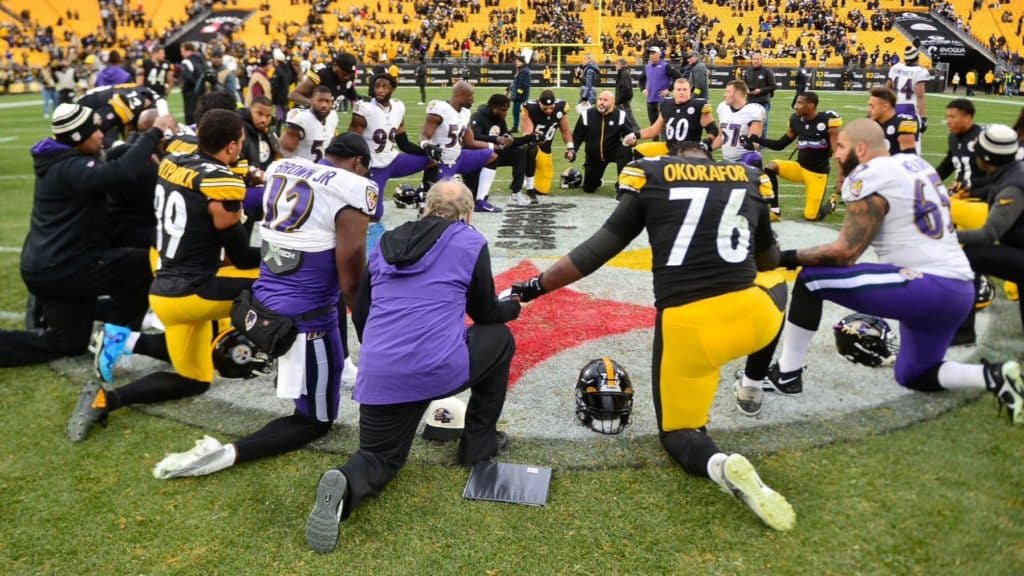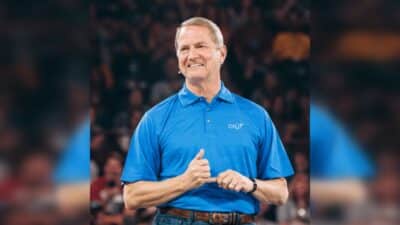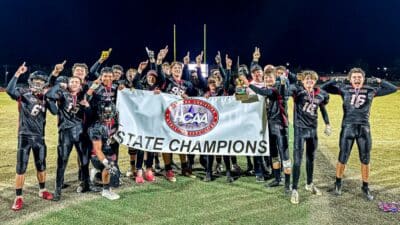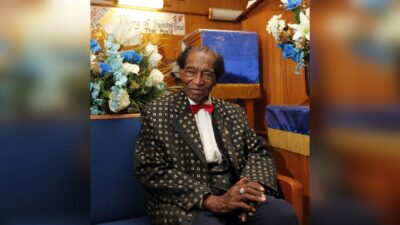Fall means NFL football, and NFL football means that staffers with Athletes in Action, the sports ministry of Cru, are busy serving a number of NFL teams.
Unlike Major League Baseball, which uses Baseball Chapel to offer players and coaches regular chapel services before nearly every game, NFL teams vary in their commitment to introducing chaplains and pastors to their organizations.
That’s because while some owners are motivated by faith, others aren’t, and coaches may not want their players to love opposing team’s players as brothers.
Most NFL teams embrace some form of spiritual support, believing that byproducts of faith—character, commitment, and integrity — can strengthen their organizations, strengthen players and wives, and even reduce negative news stories about players’ off-the-field antics.
A few NFL teams have chaplains on staff, and most outsource the work to local churches and pastors or national organizations like AIA, which this season has staff members working with the Carolina Panthers, Cincinnati Bengals, Cleveland Browns, Denver Broncos, Jacksonville Jaguars, New York Giants and Pittsburgh Steelers.
Your tax-deductible gift helps our journalists report the truth and hold Christian leaders and organizations accountable. Give a gift of $30 or more to The Roys Report this month, and you will receive a copy of “Hurt and Healed by the Church” by Ryan George. To donate, click here.
“At some level, teams see chaplains as a support to the teams’ goals and needs, but they vary how much access they give chaplains into the life and world of the teams,” said George McGovern, the New York-based director of AIA’s NFL Pro Staff Division.
McGovern, who has worked 47 years for Cru, formerly known as Campus Crusade for Christ, has served as chaplain for many of the Big Apple’s pro teams, including the NFL’s Jets, MLB’s Mets, and NBA’s Nets.
He served the New York Giants for 20 years and the New York Yankees for 26 years (through the auspices of Baseball Chapel), building the trust it took to become a fully integrated traveling member of the organization.
Long history in sports
AIA was founded in 1966, when Cru staff member Dave Hannah started a basketball team made up of former NCAA Division I players. The team organized exhibition games with DI teams as evangelistic events.
AIA is just one of dozens of Cru’s specialized ministries, which include the Jesus Film Project, Josh McDowell Ministry, Cru Military, Family Life and the original campus ministry. AIA’s annual budget is around $45 million. Cru’s 2022 U.S. revenue was $652 million, and it had an additional $159 million in international revenue.
Nineteen Christian sports ministries are members of ECFA. Fellowship of Christian Athletes is older than AIA (it was founded in 1954) and bigger (FCA has revenue of $207 million), but AIA has a greater presence in the NFL.
The two ministries spend a combined quarter billion dollars a year, but McGovern says the investment in NFL teams is worth it due to the sport’s prominence in American culture. In 2022, 82 of the 100 most-watched TV programs were NFL games.
“Professional sports is a high visibility industry,” said McGovern. These guys are looked up to. Some are worshipped by fans who honor the football rituals. There’s an influence and impact that professional sports has on our culture.
“If organizations like AIA and Fellowship of Christian Athletes can help some of these players and coaches grow, live lives that reflect a very high moral standard, and are even willing to verbalize how they credit their relationship with God, they will be heard by millions of people in the country and heard by tens of thousands of people in their cities.”
Teams take varying approaches
McGovern says NFL teams take one of four approaches to the spiritual development of their players and coaches.
1) Little to nothing. A few teams, including the Tampa Bay Buccaneers and the Houston Texans, invest little in chaplains or other spiritual programs. But most of the 32 teams embrace some involvement.
2) Minimal integration. Other teams invite a pastor or parachurch worker to organize and facilitate a team chapel the day before Sunday games, usually on a Saturday evening, escorting the chaplain into and out of the practice facility.
3) Moderate integration. Chaplains lead chapels, hold Bible studies with players and/or coaches, and have some access to the athletes and coaches at designated times during the week, such as conversing over lunch in the players’ and/or coaches’ cafeteria. Chaplains and their wives may also lead studies with the wives or girlfriends of players’ and/or coaches.
4) Maximum integration. Chaplains feel like part of the team, traveling with the team members when they go on the road, having access to locker rooms when media are present, and building deeper relationships with the wives and girlfriends of players and coaches.
The chaplain’s “dance”
McGovern says trust is the foundation of the chaplain’s relationship with the team and its people.
“It’s like you’re a self-invited guest into that world,” he says. “And it’s almost a dance you do to build relationships and build trust.”
Admittance to this world requires discipline, the ability to keep secrets, and a complete absence of fan behavior, such as seeking autographs or tickets to games.
“You have to understand their world,” McGovern says. “Everyone outside of that locker room or practice facility wants something from them. They may not verbalize it this way but the first question they have for a chaplain is, ‘Is he in this for what he can get out of it? Or is he doing this for what he can give?’
“If you don’t love it, or you’re not it for what you can give to the team, you will remain an outsider.”
This article is republished with permission from MinistryWatch.
Steve Rabey is a veteran author and journalist who has published more than 50 books and 2,000 articles about religion, spirituality, and culture. He was an instructor at Fuller and Denver seminaries and the U.S. Air Force Academy.




















